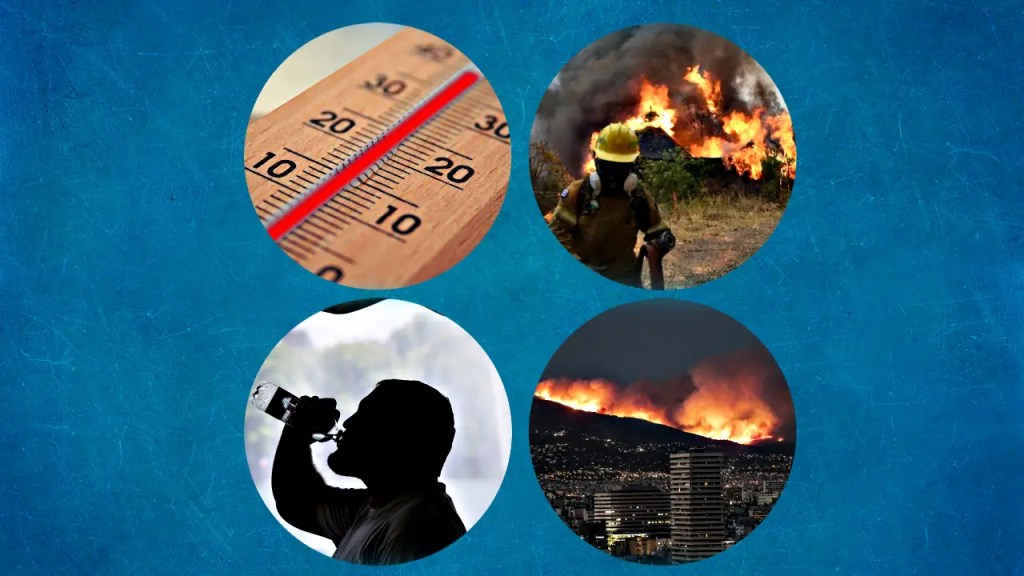Authorities in France and Spain have evacuated tens of thousands of people from their homes. In the French prefecture of Gironde, which is located in Bordeaux, more than 1,200 firefighters are on duty. In Portugal, thousands of hectares have burned. As a heat wave rages across Europe, Britain prepares for its warmest temperatures ever. Authorities are advising Britons to stay inside and watch out for one another.
Extreme heat in 2022
Europe is sweating, and an extreme heat wave is fueling major wildfires in several countries.
The United Kingdom is not known for hot weather, but this week is exceptional. The mercury is approaching 40 degrees, and meteorologists say the heat could become a regular occurrence by the end of the century.
The heat prompts railroad operators to lower speed limits amid concerns that the heat could cause tracks to warp. As a result, some people stay home while others take the heat in stride.
The heat wave has been brewing over Spain, Portugal, and northwest Africa for some time and is now moving north over France and the United Kingdom. That makes it easier to break records, and the planet is getting warmer.
Heat records have already been set in Japan this year, and Western Europe is at the top of the list today and tomorrow.
The heat wave in Europe has added urgency to the international climate negotiations that are currently taking place in Berlin.
The heat in Europe, which we now call extreme, will be normal in a few years, and it will continue to increase as global warming intensifies.
Given the current situation, it is unlikely to happen, but if it does, it will have serious consequences for the climate. For example, heat waves will become more frequent and intense.
France is one of the countries facing extreme temperatures, and Lisa Lewis told us how people in Paris are dealing with the heat wave.
The heat makes it difficult for firefighters to bring fires under control, and people are leaving and returning from vacation.
At least 360 people have died this week related to the heat wave, and that’s probably all.
Nicole Reese reports from Madrid, and Alexander De Mai is an expert on atmospheric processes and founder of Metclim, a company that provides climate change analysis. He says extreme summer heat is the new normal in much of Europe.
The heat waves are caused by human activities such as driving, industry, and our way of consumption. However, CO2 emissions are the main cause of global warming.
Climate
Our planet is indeed warming, and this is causing more extreme weather events. However, the climate has been very hot and dry for a very long time.
The U.n Secretary General is urging rich countries to keep their promises to help foreign nations deal with climate change.
The consequences of using coal for several years would still be with us.
The climate crisis affects Spain, and heat waves will likely last longer than one or two days.
Temperature
Scorching temperatures and high winds are fueling massive wildfires in several countries. The heat wave has been very hot and dry for a long time, and firefighters are struggling to bring the fires under control.
Lisa Lewis in Paris reports that temperatures are unusually high and windy, and firefighters are doing their best to fight the fires in these conditions. In Madrid says higher temperatures are contributing to wildfires across Europe.
Europe
Europe is sweating and an extreme heatwave is causing major forest fires in several countries. The heatwave has led to temperature records being broken and surpassed, and has added urgency to international climate negotiations.
Wildfires are raging in France and Spain due to extreme heat in western Europe. Portugal is suffering from drought, and the UK had its third hottest day ever.
Over 1,100 people are thought to have died due to the ongoing heatwave in southern Europe, including 510 in Spain and 659 in Portugal.
According to researchers at the EU Commission, nearly half of Europe’s territory is “at risk” of drought. Moreover, the drought is “critical” and water supply may be compromised in the coming months.
France
In France, wildfires have destroyed more than 700 acres of land, and the state railway company has suspended service between Madrid and Galicia. In Spain, more than 70,000 hectares have been destroyed by fires this year.
The French capital Paris is expected to reach 39 degrees Celsius (102.2 degrees Fahrenheit) on Tuesday.
The heat wave is expected to move out of the western part of the country on Tuesday.
What is a Heatwave?
A heat wave occurs when the maximum temperature is higher than the average temperature for five consecutive days. For example, a heat wave in South Australia consists of three consecutive days with temperatures above 39 °C. The Met Office maintains a heat warning system that classifies each local authority into one of four levels.
Heat waves form when high pressure stays over a region for several days or weeks. As a result, the air warms and dries adiabatically, inhibiting convection and preventing the formation of clouds. Low soil moisture can also contribute to the intensification of heat waves in Europe and other world regions. Heatwaves and droughts reduce ecosystem carbon uptake, and stress on ecosystems will cause changes in the ecosystem’s carbon cycle feedback.
Climate models can predict future heat waves and their severity in the United States. High temperatures cause psychological stress, affect performance, and are associated with an increase in violent crime. In addition, high temperatures can contribute to ozone pollution and bushfires. Heat waves can cause damage to roads, water lines, power transformers, and railroads and cause power outages. As the 21st century progresses, heat waves will become more frequent and intense.
